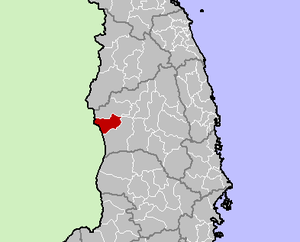Đức Cơ district
Appearance
(Redirected from Đức Cơ District)
You can help expand this article with text translated from the corresponding article in Vietnamese. (March 2009) Click [show] for important translation instructions.
|
Đức Cơ district
Huyện Đức Cơ | |
|---|---|
 Location in Gia Lai province | |
| Country | |
| Region | Central Highlands |
| Province | Gia Lai province |
| Capital | Chư Ty |
| Area | |
• Total | 277 sq mi (717 km2) |
| Population (2018) | |
• Total | 62,031 |
| Time zone | UTC+7 (Indochina Time) |
Đức Cơ is a district (huyện) of Gia Lai province in the Central Highlands region of Vietnam.
As of 2003 the district had a population of 49,745.[1] The district covers an area of 717 km². The district capital lies at Chư Ty.[1]
References
[edit]- ^ a b "Districts of Vietnam". Statoids. Retrieved March 13, 2009.


